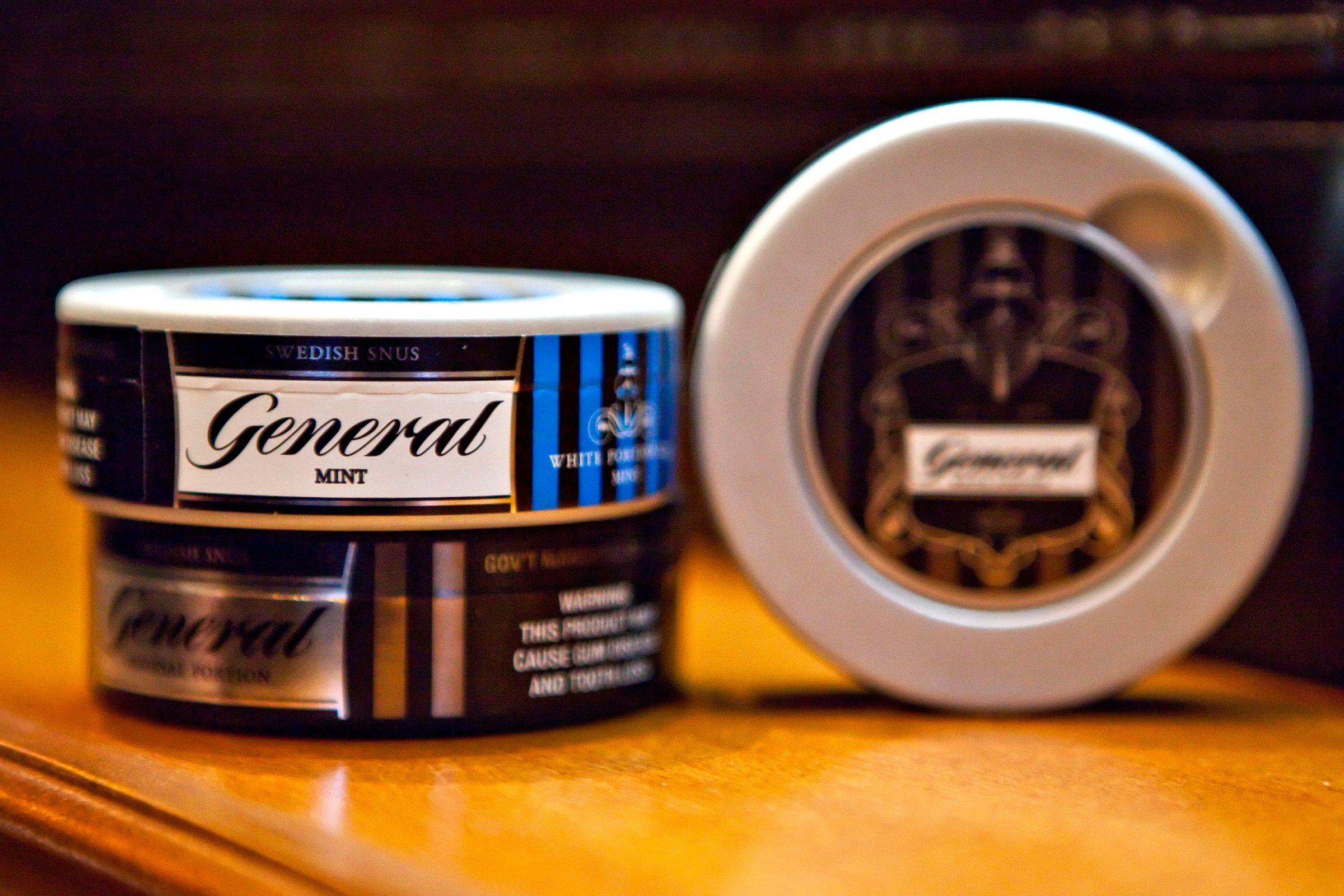
An upcoming decision from the U.S. Food and Drug Administration (FDA) could have significant implications on U.S. tobacco control.
On Thursday and Friday, an advisory committee to the FDA is meeting to review an application from the smokeless tobacco company Swedish Match. The Stockholm-based company wants to be permitted to legally claim that their tobacco product, called snus (pronounced “snoose”) is safer than cigarettes. The company disagrees with some of the warnings required for its label, and instead wants to use a warning that says “No tobacco product is safe, but this product presents substantially lower risks to health than cigarettes.”
Snus is a small cloth baggie that contains moist tobacco powder. They’ve been described as looking like mini tea bags. Users tuck the small pouches under the upper lip to get a buzz from the nicotine. It’s sort of similar to dip or chew, but without all the spitting.
The company’s argument is that snus is behind what’s called the “Swedish experience.” Sweden has a similar tobacco consumption rate compared to other European countries, but has the lowest smoking-related mortality rate. Snus has credited itself for offering Sweds (it’s used primarily by men) a safer alternative to cigarettes, becoming the country’s predominant product. The company wants to remove the required warnings that say the product causes mouth cancer, gum disease and tooth loss arguing there isn’t evidence to support that for their product and they would like to make the claim that the product safer than conventional cigarettes.
“Given all the science we have, it’s clear to me that the current label is misbranded. The label says a lot of things that there simply is no scientific basis for. We would like to be able to communicate that,” says Dr. Lars Erik Rutqvist, an oncologist and Swedish Match’s vice president of scientific affairs. Rutqvist was a cigarette smoker while in medical school (he says at the time that was still common), but wanted to quit when he decided to become an oncologist. He used snus to do so.
“I think it’s problematic that the only message that American smokers are left with today is you should quit,” he says.
The FDA panel is expected to make a vote after the hearing ends on Friday. The panel’s vote will provide a recommendation to the FDA. The agency could follow that recommendation or decide not to adopt it. If the committee agrees with Swedish Match, experts within the tobacco control community believe it could have some major implications for tobacco control regulation.
“This is a critical decision because of the precedent it sets,” says Kenneth E. Warner, a professor of public health focusing on tobacco control at University of Michigan. “It’s precedent setting in the sense that if this goes through it will be the first product to get this reduced risk authorization from the government. It would allow a tobacco harm reduction message to be placed on a product other than an FDA certified treatment such as nicotine replacement products. So it’s pretty important.”
Smokeless tobacco is considered less dangerous than cigarettes, since it doesn’t have toxic smoke. There are members within the public health community that believe that pushing consumers towards lower nicotine-containing products or products that put less harmful chemicals in buyers’ bodies is good for public health.Warner is among them. Others, including the U.S. Centers for Disease Control and Prevention (CDC), have come down hard against such products like e-cigarettes for example, arguing using the products can lead to dual use instead of cigarette smoking cessation.
“Although there’s evidence snus may have reduced harm, reduced harm products are not the same as safe products,” Dr. Michael Steinberg, director of the Tobacco Dependence Program at Rutgers University told NPR.
Warner says the company will have to prove to the FDA that it can back up it’s claims, and the FDA must be confident that the changes wouldn’t have negative consequences. “If information about how snus lowers harms encourages kids to start using it because they don’t think it’s particularly dangerous, and then they graduate to cigarettes because they want the faster nicotine kick, that’s a bad thing,” says Warner. “If snus were to get former smokers to start using it and it has health hazards, that’s not good. It’s hypothetical. The best evidence we have comes from Sweden.”
What the advisory committee will decide and the reverberations of that decision remains unknown, but it it will further fuel the debate over modified risk tobacco products and whether harm reduction has a place in tobacco control.
More Must-Reads From TIME
- The 100 Most Influential People of 2024
- The Revolution of Yulia Navalnaya
- 6 Compliments That Land Every Time
- What's the Deal With the Bitcoin Halving?
- If You're Dating Right Now , You're Brave: Column
- The AI That Could Heal a Divided Internet
- Fallout Is a Brilliant Model for the Future of Video Game Adaptations
- Want Weekly Recs on What to Watch, Read, and More? Sign Up for Worth Your Time
Contact us at letters@time.com